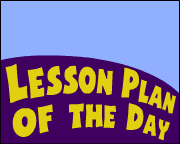Reading Passages That Build Comprehension Fact and Opinion
Anticipation Guides Ameliorate Reading Comprehension

Subjects
- Arts & Humanities
--Language Arts - Science
- Social Studies/History
Class
- Grand-2
- 3-5
- 6-8
- 9-12
Brief Clarification
This activity provides a good way to increment reading comprehension in the content areas.
Objectives
Students
- will utilise "apprehension guide" statements to ready the stage/a purpose for reading.
- volition utilize "anticipation guide" statements to focus on the nigh important concepts in that reading.
- volition comprehend fabric and learn of import concepts as a result of using an apprehension guide.
Keywords
anticipation guide, anticipation questions, anticipation statements, setting a purpose for reading, comprehension, key concepts, reading comprehension
Materials Needed
- any grade- and skill-appropriate content-area reading passage
Lesson Plan
This activeness provides a practiced way to increase reading comprehension in the content areas. This approach will i) ready a distinct purpose for reading and 2) assistance focus students' reading on the most important concepts you desire them to learn.
Select a reading passage in advance. For immature students, that passage might be a page or two in a text; for older students information technology might be longer.
Determine the key ideas that you would like students to accept from their reading. (Don't overwhelm students; the key ideas for nigh reading passages tin be summarized in a few statements; even most long text passages can exist summarized in five statements or fewer.) Write down those key ideas.
Once your central-thought statements are written, revise two or iii of them and so that they tell something imitation -- simply still believable -- almost the passage.
Example:
Education World's News for KIDS feature provides some skilful examples of content-area reading; and many of the teacher guides for those news stories include an apprehension guide. For example, the teacher's guide for the news story Japanese Scientists Photograph Behemothic Squid offers the post-obit "anticipation guide" statements:Some of the statements higher up are true; others are simulated.
- For many years, scientists have studied giant squids in their natural habitat.
- Giant squids live in shallow waters of the Pacific Ocean.
- Giant squids are very slow and "lazy" creatures.
- Behemothic squids have the largest eyes of whatever living creature.
Before students read ask them to respond to each of your "anticipation" statements. Based on what they know or might estimate to exist correct, they should place if each statement is true or false. Doing this in advance sets students' assumptions in place. As they read, they will be looking to ostend those assumptions -- or to "take their eyes open" to learning new data that refutes them.
After reading, students should in one case once more read the "anticipation" statements. Is each statement true or simulated?
Example:
The instructor'due south guide for the news story Japanese Scientists Photograph Giant Squid provides the correct responses to the anticipation statements that were posed:
- For many years, scientists accept studied behemothic squids in their natural habitat. (false, few squids take been seen in their natural habitat)
- Giant squids live in shallow waters of the Pacific Ocean. (false, they live in the deepest parts of the ocean)
- Behemothic squids are very boring and "lazy" creatures. (false, the new photographs show squid to exist more than agile creatures than previously believed)
- Giant squids have the largest optics of any living creature. (true)
Do your students' post-reading responses to the statements differ from their pre-reading responses? Those changes in response are clear indicators of information learned.
Endeavor the "apprehension guide" approach. Well written statements focused on the most of import concepts will assist you achieve your goals of 1) setting a distinct purpose for reading and two) helping to focus students' reading on the most important concepts you want them to larn.
Assessment
Did the anticipation guide help focus students' reading of the selected content-surface area text? Did they learn the most important concepts presented in that text?
Lesson Plan Source
EducationWorld.com
Submitted By
Gary Hopkins
National Standards
LANGUAGE ARTS: English language
GRADES Thousand - 12
NL-ENG.Yard-12.two Reading for Understanding
NL-ENG.1000-12.three Evaluation Strategies
NL-ENG.K-12.6 Applying Knowledge
NL-ENG.K-12.12 Applying Language Skills
Come across more Lesson Plans of the Day in our Lesson Plan of the Day Archive. (There you tin can search for lessons by subject too.)
For additional language arts/reading lesson plans, see these Didactics Earth resources:
- Lesson Planning: Language Arts
- Language and Literature Subject Center
- Teacher-Submitted Lesson Plans: Arts & Humanities
- News for Kids
- The Reading Room
- Writing Bug
- Every-Day Edits
- Work Sheets from Teacher Created Materials: Language Arts
Teaching World®
Copyright© 2006 Education World
03/23/2006
Source: https://www.educationworld.com/a_lesson/dailylp/dailylp/dailylp067.shtml
0 Response to "Reading Passages That Build Comprehension Fact and Opinion"
Post a Comment